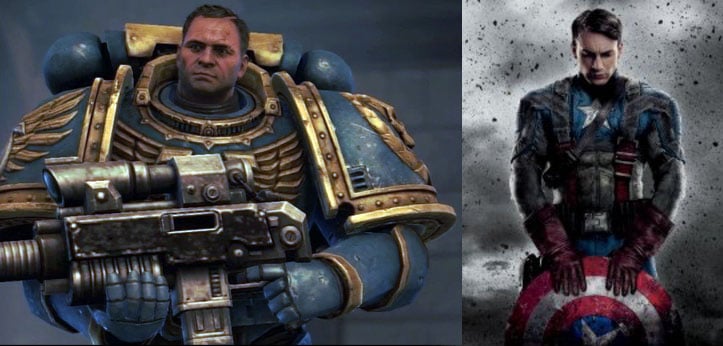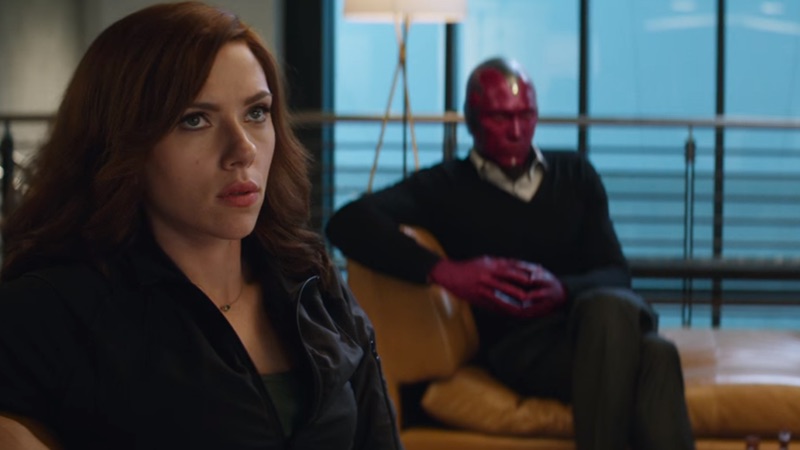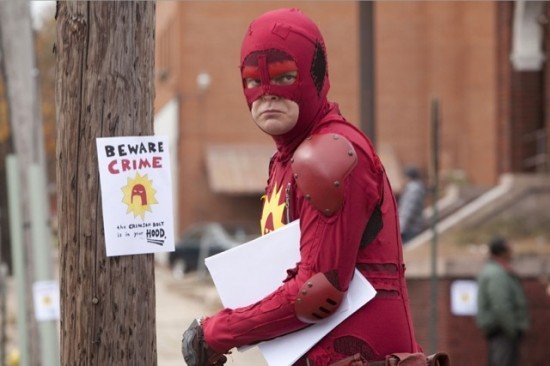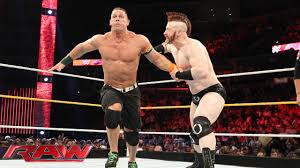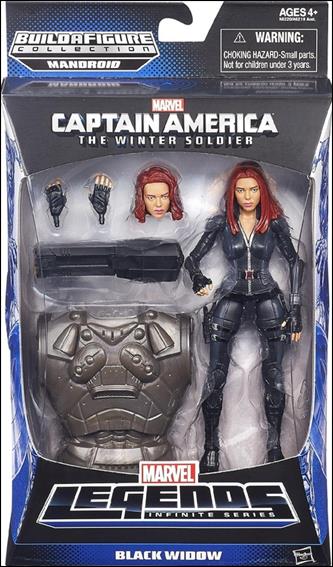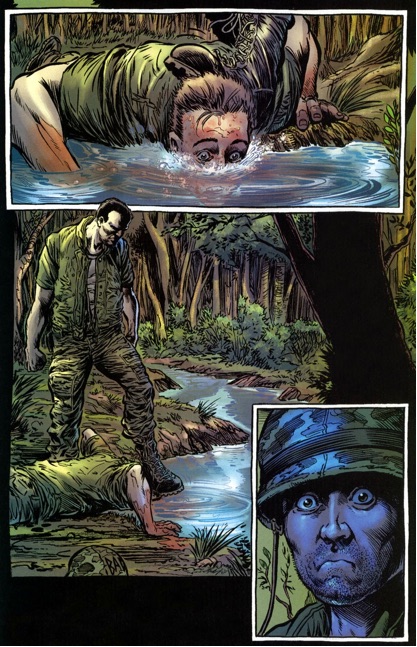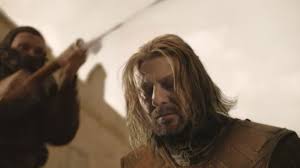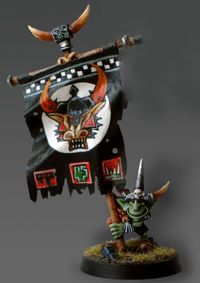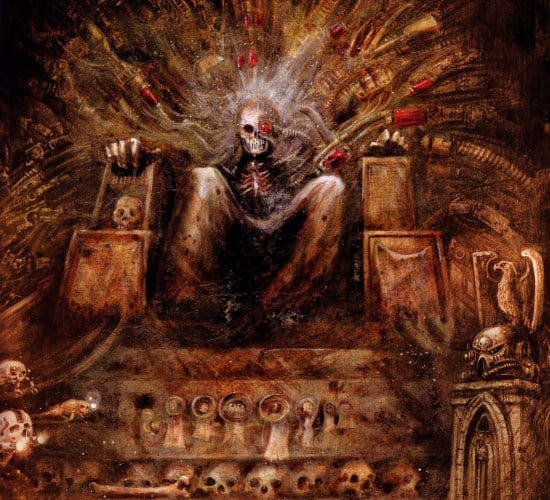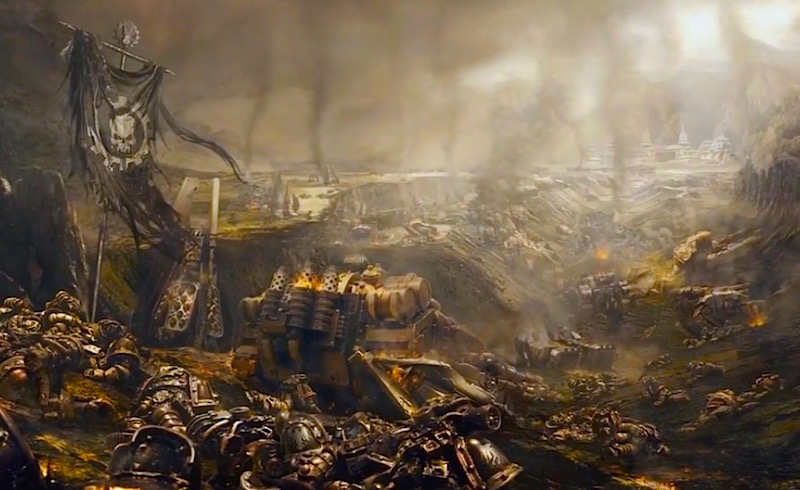40K Won’t Advance & Captain America Won’t Die


Marvel proves why the Grimdark will never ever reach midnight.
Captain America needs to die: Or: The Problem Of Merchandise
An editorial by BoLS Lounge Alumni York Necromancer
So Captain America is my favourite character in the MCU. Has been ever since I saw ‘The First Avenger’, and honestly? He may achieved the unthinkable and overtaken Punisher as my favourite Marvel character. It’s weird; normally I’m all about the GRIMDARK, but Cap… In a cultural landscape where every other character is cynical, consumed by manpain, or frankly insane, there’s something really refreshing about a protagonist who isn’t. I love the idea that he’s not driven by a past tragedy, or some wonky Freudian excuse. He’s just this good man. He doesn’t get his powers from wealth or being born to it, or just getting lucky. He earned everything he’s got. He’s a working-class boy done good, and what’s he done with his power? Used it to help people. And he’s also refreshingly free from the moral incompetence of a character like Batman; Cap doesn’t jump through hoops to justify the violence he commits. He’s more than prepared to kill when necessary. But unlike Crazy Steve, he doesn’t glory in violence. You always get the feeling Cap would rather be sat at home drawing, or maybe just listening to some music. He only breaks out the can of whoop-donkey when people need to stay safe. I love that his symbol is an unbreakable shield: what a perfect metaphor that is.
So, yeah, it’s weird: I should despise him, but I pretty much love everything about him. He’s the absolute heart of the MCU, the unshakable core of the Avengers, a man whose power is making things simpler for others: there’s right, and there’s wrong, and you always choose the right thing no matter how hard it is, because it’s the right thing.
Captain America needs to die.
An Unprecedented Cinematic Experiment.
As huge a Cap fan as I am, that statement might sound strange. But it’s true. He may be my very favourite character in the whole MCU, but he needs to go.
I don’t want Captain America to die, but he needs to.
As some people may have inferred from one of my previous blog posts, I did my degree in film, and it’s because of my roots in cinema that I’m kind of in love with the Marvel Cinematic Universe as an artistic concept, quite separately from the characters.
I find the films fun, and frequently excellent, but it’s not for the their pure entertainment value that I love them. No, I love them because they’re the most incredible experiment in long-form cinema that’s ever been conducted. Seriously, ‘Civil War’ is the thirteenth film in an ongoing story arc that been running since 2008. Marvel is – unbelievably – managing to tell a single, rolling story spread over multiple, diverse films. This is a completely unprecedented achievement, and it doesn’t get enough recognition as the so-impossible-it-borders-on-miraculous achievement it is.
And it only gets more incredible when you look at the insane characters it’s sticking together. They’re all so completely tonally unconnected! Thor is a completely ridiculous high-fantasy character who just shouldn’t be able to mix with the hard-edge techno-thriller stylings of Iron Man, whose too-cool-for-school snark shouldn’t mix with the abject tragedy of Hulk, or the goofy comedy caperings of Ant-Man. It should be like mixing oil and water and glue and sticky toffee pudding, leaving behind nothing but a putrid, benighted mess.
But somehow, it all works. Even when you get a lacklustre offering like ‘Iron Man 2’, or ‘Thor: The Dark World’ or even ‘Age of Ultron’, a film where things don’t quite come together, it’s still kind of enjoyable because you’ve seen the characters before and they’re always going to have something awesome to do. Not to mention, there’s still this feeling that there’ll probably be a later film that makes up for it.
Pictured: The Vision’s cape’s too goofy for you? Don’t sweat it; in the next film, this sweater solves all those problems.
It’s reached the point that the inevitable backlash has begin – that train’s never late. So we get the fashionable hate for Marvel, lamenting their success, decrying them for running so long, complaining how Marvel’s ruining cinema by filling our multiplexes with superheroes, as though there’s nothing else to f**king watch… On and on and on… And, you know, it’s true, I honestly couldn’t care less about any of the other bunch ‘Fantastic Four’, ‘X-Men’ or (Glob save us) the DC Cinematic Murderverse. I didn’t even think ‘Deadpool’ was that good.
Pictured: obligatory plug for a much-better R-rated superhero film that not enough people have seen.
For me, the thing is that Marvel’s efforts are unprecedented in Western cinema, and I’m fascinated to see where they end up. It’s like if HBO had the budget of the US military. Yeah, there might be episodes you don’t like, but Tom Hiddleston’s there, it all feels like it has weight, and the metanarrative is going somewhere.
However, as time has gone on, more than a few problems have begun to rear their heads, and aside from things like continuity issues which all long-running narratives suffer from, it’s this:
There’s no tension.
Now, while we know the heroes are going to win in most Hollywood films, the comics the MCU are based on take this a stage further, to the point where not only do we know the characters are in no jeopardy, but we can be categorically sure they won’t ever die. Why? Well, that’s entirely down to their nature.
The Reason Why John Cena Won’t Turn Heel.
John Cena has been WWE’s top wrestler for nigh-on a decade. He’s a face, a good guy. He should be getting cheers.
But he doesn’t. He gets cheers and boos. A lot of boos. Why? Because he’s a terrible wrestler. Everything he does looks faker than Iain Duncan Smith’s concern for the poor, and if you’re an adult fan like me, that makes it nearly impossible to suspend your disbelief. It spoils the matches and betrays the artistry of the craft.
Now, normally when a wrestler gets boos, it’s a simple enough matter to sort things; just have them turn heel. Once they’re a bad guy, well, all those boos are great, because the heel is supposed to get boos.
The trouble is, John Cena gets cheers too. But from who? Well, the answer is kids. Kids love John Cena because his in-ring persona is basically them. He’s a big, simple, easy to understand good guy who looks great, wears bright colours and always beats the bad guy. The kids don’t understand the artistry of bumping, the skill of selling, the need for careful ring psychology to craft a match. They’re not watching for the same reasons adult fans are. Their love for wrestling is so much purer.
And their love sells a lot of T-shirts. And pyjamas. And hats, wristbands, action figures, computer games…
John Cena has sold more merchandise than any other wrestler, ever. His merchandise outsells every other wrestler’s combined. If he turns heel, those sales crash: kids don’t like the bad guy. So, even though he’s been booed for a decade, Cena remains the company’s top face.
Now, Cena’s merchandise sales have fallen somewhat over the last year, but the fact he still hasn’t turned shows how wary WWE is about killing that particular golden goose.
A lot of fans of geek culture accept the things they’re interested in at face value, but there’s a whole lot of real-world stuff going on behind the scenes driving the stories and characters we consume. And do you notice that word?
‘Consume’.
We don’t watch Marvel films, or read DC comics: we consume them. We exchange our money for them, and when you’re looking at something like John Cena, or Undertaker, or Captain America, something that’s tied into more than just the stories written about them, something tied into multimedia merchandising opportunities, well… We’re not looking at anything so simple as a character any more. Once they’ve got merchandise, they’re Intellectual Properties.
And becoming an intellectual property is the death of drama.
The Problem of Joker Immunity
In comics, there are certainties: Batman will never make a difference. Gotham will always be a craphole. The Joker will never, ever be defeated. Never. Nothing meaningful can ever change, because outside the fiction of Gotham, here, in the real world, T-shirts need to get sold. Every year brings a new crop of five-year old boys who want Spiderman pyjamas. Every year brings a new crop of girls who want a Black Widow figure.
Pictured: so rare, even the Hulk’s daughter doesn’t get to have one.
Companies like money. Merchandise makes money. Kids buy more merchandise than adults. So Marvel – as with every other geek intellectual property – follows the money, meaning their comics are – ultimately – for kids. Sure, they can tell some stories of astonishing complexity (the latest run on The Vision is absolutely worth your time, BTW), but let’s be fair here: they’re aimed at children and young adults as much as they are at older audiences. You can disagree all you want, but there’s a reason Marvel created their Epic, Knights and MAX imprints.
Pictured: coming in ‘Avengers 5’ – a scene where Punisher drowns an American soldier for raping a Viet Cong sniper.
And those of you going ‘Well, the problem is the kids then; sell to the adults. The real collectors, with real jobs and big money’, well. It’s been tried. Turns out adults might love their Transformers, but they’d rather spend their money on things like house insurance, electricity bills, and food. Not to mention, every adult collector was a childhood fan once. The geek industry thrives on nostalgia; I doubt I’d be a 40K fan if I hadn’t gotten into it as a nervous eleven-year old. Today’s childhood fan is tomorrow’s big-spending collector; except in very rare cases, you don’t get one without the other.
Not to mention selling your comics to a younger audience isn’t remotely a bad thing, and nor does it denigrate adult fans. But it does put a limiter on what writers can do narratively.
See, children have no conception of the character’s backstories, because they haven’t read the literal decades of issues that existed before they were born. And it’s not like comics are massively durable; they’re printed on cheap, disposable paper, not meant to last. As a result, even with back issues now being printed in huge collected editions, it’s really hard for a child to get into superhero comics if those comics have a slavish dedication to continuity.
This is the reason for the ‘broad strokes’ timeline of comics. Peter Parker’s age is indeterminate, falling somewhere between 15 and 29. However old he is, though, he’s always the youngest though, because Spiderman’s whole gimmick is that he’s the ‘young superhero’, like Cap’s is ‘Big Good’, Stark’s is ‘the clever one’ and Punisher’s is ‘the sociopath’.
This keeps things easy for any child to understand; assuming they start at issue 1 of any story arc, they can pick up a comic and enjoy without needing too much backstory. However, those T-shirts have to get sold, which locks characters into certain, fixed personalities. Whenever a writer comes along and tries to make a permanent change, in a handful of years, it’ll be undone, because they’ve got merchandise to sell to kids.
Don’t believe me?
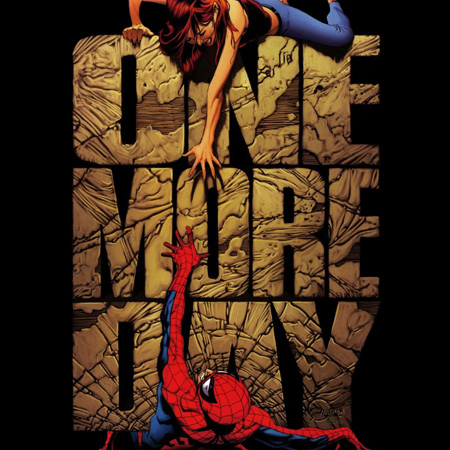 Click this link to find out how dumb this dedication to the status quo can get.
Click this link to find out how dumb this dedication to the status quo can get.
So, comics have a problem with ephemerality, and cope with it via cast-iron status quo. But the MCU has a different set of problems. Where the comics can have a sliding timeline, the MCU can’t. Its actors are aging. Robert Downey Jr. was in his forties when he kicked the whole thing off. He’s 51 now. That gives us maybe ten years more where he can play Iron Man, before the whole thing starts to feel a little… Well, weird. Not wrong, but not quite right. And this applies across all the actors. Spiderman’s in ‘Civil War’ and there’s a reason he’s fifteen: it means he can be in their films for decades if they need him to be.
The MCU is therefore, uniquely different to the comics, and therefore in the unique position of being able to do things the comics don’t.
Like inject some real high stakes drama.
I Want Captain America To Live…
As far as I can like anyone I’ve never met, I like Chris Evans. Even despite the occasional unpleasant slip-up, he comes off as a likable guy, and that’s great, because Cap needs to be likable. Where Downey Jr. is all snark and charisma, Evans is quiet and introspective. I like that. I don’t want Chris Evans to disappear from the Marvel Cinematic Universe. Not to mention, I love Cap’s backstory. ‘The First Avenger’ is a wonderful piece of dieselpunk, and by rooting him in WW2, Cap’s character somehow has a gravity that the others do not.
I would be very, very sad if Cap were to die.
… But Captain America Must Die
There have been a number of articles about how there are no ‘stakes’ in the MCU, and those claims are not without merit, especially given the source material. In comics, death is so cheap it’s a joke. It used to be that the only people who stayed dead were Uncle Ben, Gwen Stacy, Jason Todd, and Bucky. Now it’s just Uncle Ben, and they’d bring him back if they could. Seriously, at one of Jean Grey’s (many) funerals, Emma Frost actually says to Cyclops ‘Really Scott, these re-runs of your grief must be getting tiresome’.
Death is literally a joke in the comics.
We know the good guys are going to win. We know that the bomb’s timer will stop at one. We know that the Bad Guy will fall to his doom like always.
We come to watch the fireworks and yawn as the heroes pat each other on the back, contented that All Is Right With The World.
‘Game of Thrones’ isn’t a perfect series – I have some serious reservations about the way it treats women. However, the one thing it has done, is shown that with a large enough cast, you can kill whoever you want.
Literally, whoever you want.
Now, I’m not saying that Marvel needs to ‘Red Wedding’ everyone. But say Cap dies, and – more importantly – doesn’t come back. Say Marvel holds its nerve and keeps him gone. No final words, no magically TAHITI resurrection. That sends the audience a message: there are stakes, and they are For Real.
The MCU has an opportunity to do something real; to become the ‘Game of Thrones’ of cinema. To make death real. Yeah, they fumbled the ball with Agent Coulson… But they didn’t with Quicksilver. The difference, of course, is that no-one really cared about Quicksilver. Wouldn’t it be amazing if they Ned Starked Cap? Suddenly, everything would be up for grabs.
I love Cap, but if he goes, the status quo goes with him. Just like the end of ‘Empire Strikes Back’, where everything was left unresolved and broken, there’d be real consequences. Not to mention, it allows Falcon to take over as the new Captain America. That instantly gives the MCU a shot in the arm, promotes diversity, and shows that anyone could go. The thing is, legacy characters like this work. Want proof? Look at Doctor Who: the longevity of the series is entirely down to regeneration. Also in the UK, we had two superb series, ‘Being Human’ and ‘Misfits’. Both series killed literally every single one of their main characters but before this, they developed replacements ahead of time. Whenever a main character went, there was a different, but equally awesome character ready to take over.
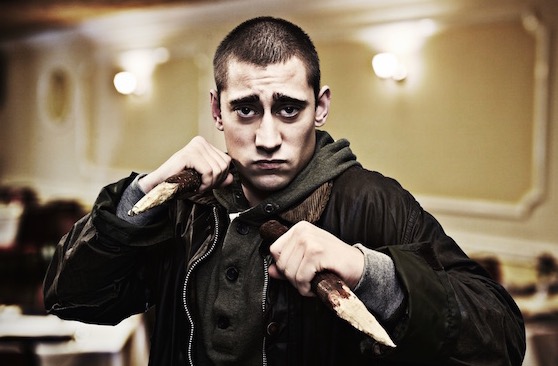 Pictured: the single greatest werewolf there has ever been.
Pictured: the single greatest werewolf there has ever been.
Even though beloved characters were gone, the series carried on. They weren’t the same, and we missed the characters that were gone, but that’s the thing about death in real life: it’s final. The fantasy that we can have beloved people back in our life is seductive, but to see that fantasy played out undermines any drama, as well as being dishonest.
If they kill Cap, they move the MCU into seriously dramatic territory. It moves the metaplot forwards in a big way, and makes the stories that follow that much more powerful, because our heroes are no longer safe.
So, how does all this basic narrative theory link to our little hobby?
Wargaming Isn’t A Story
Well, one of the things you constantly hears is how 40K should ‘move the plot forwards’.
‘I’m tired of things as they are. I wish GW would just move the plot forwards.’
On the surface, this seems like a really solid idea. I mean, 40K’s been going for nigh-on thirty years, and over all that time, nothing’s really changed has it? We’re always reading about how Chaos is going to consume everything, how the Tyranids are going to consume everything, how the Necrons are going to consume everything. Or how they were, before, you know, they became just much more interesting. When is this all going to lead to something, asks the 40K fan? When are GW actually going to fulfil those threats? When do the signs and portents actually coalesce into something more than just empty words?
In short, when are they going to stop tightening their power-fist clad grip on our gaming blue balls?
Surely after all these years, it’s about time. The Emperor’s been a corpse for ten thousand years. Let’s finally let him die, have Abaddon finally succeed in his Black Crusade, and plunge the Imperium into madness. Wouldn’t that be awesome?
See, I don’t think so. Actually, I think moving the 40K plot forwards is the worst possible decision Games Workshop could make. See, I get the desire for the ‘plot’ to advance – I love the idea of Cap dying, of seeing the drama that unfurls – but really, what actually is the ‘plot’ of 40K? Because I don’t think there is one. Who’s the main character of the Warhammer 40,000 universe? The Emperor? Abaddon? Eldrad? Khârn?
Pictured: Makari, obviously.
Better yet, who’s the supporting character? I mean, we know who the bad guy is: literally everyone. But the other roles…?
See, the people who want to advance the plot have, in my opinion at least, fundamentally misunderstood the nature of Warhammer 40,000. It isn’t a story, and whilst it might superficially look like one, to think it is a terrible error.
40K is a sandbox. It’s a space to play in, to create stories within. And you don’t tell a story about the sandbox; you tell a story with a sandbox. It’s a subtle distinction, but one some people don’t seem to like.
Because there is a narrative, but the reason the storyline can never advance is because it’s not GW’s story: it’s OURS. Yours and mine, on a very personal level. It’s the reason the game is skewed so heavily towards narrative play, away from competitive. It’s why there’s so many sidebars about ‘Forging The Narrative’. Your army is the one the story is about; yours and your friends. Your local gaming group, you girls and guys are the heroines and heroes of story, not the Emperor.
Consider what advancing the storyline would actually mean. On the surface, it looks like it means everything would change. But would it? I suspect that ultimately that change wouldn’t be so huge as you might think.
The proof of this lies with the Horus Heresy. There’s Forge World’s Heresy-era game we can play, and frankly it looks a lot like 40K. There are differences in armies and the like, some lovely models, but what it really is is just 40K with a different set of army lists. A 50K game would probably look very similar, and for it to be worthwhile, it would have to bring something different and better than the 40K universe.
So what could that be? 30K has Horus, the Primarchs, the Emperor, the full might of the Imperium at the greatest stage in its history. What would 50K have instead? Perhaps Mk IX armour as the norm, and a bolter with rotary drums as standard? Whatever else it has, Marines will be Marines. They’re not going anywhere, because they’ve got the same immunity to plot as the Joker does: gotta shift that merchandise.
And if you’re the kind of person who hates Ultramarines, let me ask you this: who do you think is going to be the hero of the 50K setting? Assuming the death of the Emperor and the collapse of Terra, without the fascist evil of the Imperium to hold them back, there’s nothing to stop the Ultras from becoming the Mary Sue noblebright heroes they’ve always secretly wanted to be.
Consider how much worse this will be if Gulliman really is in suspended animation and does come back. Imagine him as the new Emperor.
Then there’s the problem of the Xenos species. They don’t get as much love as the human factions to begin with, and you know that in 50K, they won’t fundamentally change. Tyranids might get new models to represent their accelerated evolution, but it’s not like those are going to be anything radically different from what’s available now. Orks are orks, and thus utterly impervious to change. The Eldar, it’s reasonable to assume, will disappoint us all by looking the same (assuming they aren’t just Squatted). The Necrons likewise will probably not change overmuch. As we know, in all sci-fi, the older an alien species becomes, the more it always looks the same. Will Smith pilots the equivalent of a Spitfire into the alien ship in ‘Independence Day’ and not one of the aliens bats and eyelid, because, as we all know, when it comes to writing, humans are the only species that’s immune to cultural stasis.
All of which basically leaves Chaos, who, again, aren’t going to be too different. Maybe the Primarchs will be out of the Eye of Terror and playable, but honestly, you can already do that in Apocalypse, and I can’t imagine it’s going to be too many years before GW releases Nagash/Bloodthirster-sized kits of them anyway, because money is delicious. I hate Chaos, and I’d buy a massive kit of full Daemon Prince Angron because of course I would.
Sometimes, Stasis Is A Good Thing
Ultimately, the only people affected by an advancing plotline would be the Imperium, which can ultimately only change two ways: it could get better or worse. If if gets better, 40K loses a huge amount of its uniqueness. The fact that humans are the villains is one of the major things that makes 40K awesome.
Wargaming is narrative, but it isn’t a narrative, and that’s an important distinction. We can tell stories through it, but it’s not a story itself.
And a final thought. People who want to advance the plot generally use that to imply they want the Imperium to fall. They think there’s a lot of fun to be had in the idea of a ‘post-apocalyptic’ 40K universe. But I think they’ve missed the fact that they’re already playing the game they want to be. You can’t really have a ‘Post-Apocalypse’ version of the 40K universe, because that’s what 40K is: there was an apocalypse, and it did destroy the Imperium.
It was called The Horus Heresy.
~If you think about it in those terms, 40K is – technically – already an advancement of the plot.

